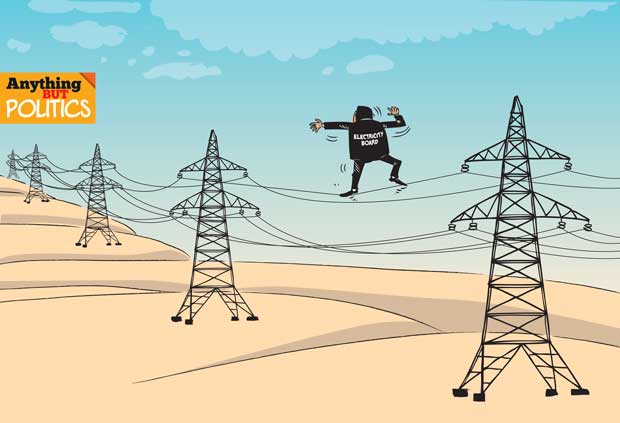Reply To:
Name - Reply Comment

The President springs surprise: earlier warnings that urgent repairs were needed at the transformer yard in the Biyagama Substation, had gone unheeded
Was the blackout due to neglect?
 The blackout, the worst in 20 years, caused much consternation to the government as it happened at a time the country was facing many economic headwinds. The blackout did not spare even President Maitripala Sirisena in the discharge of his duties. At yesterday’s Cabinet meeting, the President noted that the generator installed at the Presidential Secretariat had not functioned during the blackout and that he had to cut short his work and go home.
The blackout, the worst in 20 years, caused much consternation to the government as it happened at a time the country was facing many economic headwinds. The blackout did not spare even President Maitripala Sirisena in the discharge of his duties. At yesterday’s Cabinet meeting, the President noted that the generator installed at the Presidential Secretariat had not functioned during the blackout and that he had to cut short his work and go home.
“What an embarrassment it would have been had there been a foreign dignitary in my office! The generator did not work at the time. So, what can I do but go home,” he had said.
An explosion at the Biyagama Receiving Station triggered the blackout throughout the country The reason for the explosion is yet to be established but the authorities concerned including Power and Energy Minister Ranjith Siyambalapitiya did not rule out an act of sabotage. Anyhow, the blast turned off the entire grid.
At the moment, various committees appointed to ascertain the truth are active in investigations. President Sirisena, who is also the Commander- in- Chief of the Armed Forces, deployed the army to guard electrical installations in the aftermath of the blackout.
The damage in the transformer yard resulted in the government announcing regular power cuts, to be phased and implemented throughout the country for a couple of days
The power failure and the subsequent power cuts have taken their toll on the country’s enterprises, particularly the small and medium scale entrepreneurs relying on an uninterrupted electricity supply to operate their businesses.
Among the affected are beauty salon operators, frozen food and dairy products businesses, vehicle repair work, construction activities and so on. Worse, Colombo Stock Exchange transactions were suspended for a while due to the power failure yesterday.
Was the blackout due to neglect?
The President, at the regular Cabinet meeting yesterday, also made a startling disclosure. He said apart from the relay of personal grievance during the blackout that a senior engineer of the Ceylon Electricity Board (CEB) had written to the authorities some time back asking for urgent repairs [to items of machinery] at the transformer yard in the Biyagama Substation, a request that had gone unheeded. The Cabinet spoke of a necessity to have persons with proper managerial skills to run state ventures.
Sri Lanka has earned its reputation as the only country in South Asia with uninterruptions in power supply for 24 hours of the day. Power outages are commonplace in other countries including India. It serves as a key incentive for investment. As a result, it becomes a sine-quo-non to sustain the power supply.
It is not yet known whether the disregarding of that engineer’s request resulted in the blackout. A proper technical and professional analysis will discover what went wrong. Nonetheless, if it is the actual cause, it would become a matter for great regret. It will become yet another example of the authorities concerned having a notorious tradition of paying scant regard to issues warranting prompt attention. Such callous disregard has cost the country dearly as past experience has shown.
After the 1994 tsunami disaster that claimed over than 40,000 lives and vast damage to property, some experts had said that they had predicted the possibility of such natural disasters hitting the country. But their pronouncements had not been taken seriously and the country paid for it.
Actually, last Sunday’s nationwide outage came when an investigation was already under way into the blackout on February 25.Some defects in the transformer yard had been identified by a committee earlier during the previous rule as well.
At a press conference, Lanka Sama Samaja Party’s (LSSP) Prof. Tissa Vitarana conveyed how a Cabinet sub-committee chaired by him found technical defects at the transformer yard that had required attention but that no action had been taken.
In similar fashion, a Parliamentary Select Committee (PSC) was appointed after the train-bus collision in Yangalmodara at an unprotected level crossing on the Colombo-Kurunegala main road back in 2005. Forty bus passengers died in that tragedy caused by the driver’s recklessness.
The PSC, chaired by late Minister Mano Wijeratne, compiled a report on the findings related to the rising level of accidents involving motor vehicles, and made recommendations to minimise them. Over ten years have passed since then but road accidents, including those at unprotected level crossings, continue to take their toll on lives even today. In fact, the situation has taken a turn for the worse.
The authorities concerned should give mind to ‘going easy’ on crucial issues with the potential to cause disastrous consequences if not addressed in time.
Cabinet amusement over nutrition package to expectant mothers
Cabinet ministers were worried about the blackout at the meeting yesterday. There was some amusement too when discussing the paper to grant a nutrition package worth Rs.2000 to expectant mothers. When the paper was taken up for consideration, the President found that Subject Minister Chandrani Bandara was absent. After remarking on her absence the President, had said, “Our Cabinet ministers can also have more children because of this benefit,” He added to say that the Woman Affairs Minister should not opt for it. There was laughter all around.
Govt looks to China for assistance
Amid a liquidity crisis, the government seems to be looking to China for succour in terms of loans and investments. Prime Minister Ranil Wickremesinghe is scheduled to visit China next month. Ministers Malik Samarawickrama and Sagala Ratnayake have already concluded a tour in China on March 4 to work our preliminary arrangements for the Prime Minister’s visit. Sino-Lanka ties that stood the test of time were strained over the suspension of the Colombo Port City Project, a real estate investment by a Chinese company to reclaim 233 hectares of land from the sea. It is learnt that the Chinese side wanted to see some progress on the project ahead of the Prime Minister’s visit. After the two ministers returned to the country, the government gave the go-ahead for it.
China is a key financier of global infrastructure development today. Last year, Britain, a traditional ally of the United States, accorded a royal welcome to Chinese President Xi Jinping and struck economic investment deals amounting to billions of US dollars. In this instance, Britain fell in line with reality of China’s growing influence in the global economic sphere, a fact nobody can ignore. Most nations have come to terms with this, and turned to China for assistance, albeit their geo-political concerns in other aspects.
Investments will top the government’s list of objectives to be achieved from the April visit to China. An investment zone in Hambantota and joint ventures with Chinese firms to develop the port and the airport in the same district are among the proposals to be discussed.
It is learnt that the Prime Minister had decided to include Housing Construction Minister Sajith Premadasa in his entourage to China.
SLFP and Joint Opposition on a collision course again
The Sri Lanka Freedom Party (SLFP) and its faction loyal to former President Mahinda Rajapaksa are again on a collision course over the latter’s decision to have a major public rally in Colombo today against the government.
Already, SLFP General Secretary Duminda Dissanayake has sent letters to its organisers, warning against the participation in this rally. But, Rajapaksa loyalists are determined to defy the SLFP hierarchy and to proceed with the convention. The SLFP interprets it as a prelude to the formation of a new party, denting its vote base. For the first time after the electoral defeat in August, last year, Rajapaksa woulg be appearing at a public political rally. Alongside, former JVP leader Somawansa, who now heads a political entity called the ‘People’s Servants Party, will address the gathering rally together with party leaders.
The country is likely to witness more political events of this nature in the months to come.
Candle-lit meeting at Dinesh’s house
On the blackout night, Joint Opposition leaders met at the residence of MP Dinesh Gunawardane. It was a candle- lit meeting. Apart from logistical arrangements for today’s rally, these leaders including Wimal Weerawansa and Udaya Gammanpila, Dullas Alahapperuma, Vasudeva Nanayakkara and others, took stock of the current developments in the country; farmers taking to the street asking for fertiliser, the power crisis, rising cost of living etc.
Regarding today’s rally, attention was paid to the warning against SLFP MPs planning to attend the event. SLFP MPs, present at Gunawardane’s residence, affirmed their participation in the rally. They held the view that it was only a protest rally against the government, and therefore their participation in it would not amount to a breach of party discipline. Altogether, 39 SLFP MPs are with the joint oppositiont.
Joint Opposition recalls its heyday in the Arab world
Joint Opposition representatives including Mahinda Rajapaksa met with the ambassadors of the Gulf countries last week and discussed a host of matters. Former External Affairs Minister Prof. G.L. Peiris arranged the meeting. The Joint Opposition representatives recalled the excellent relations the Rajapaksa government had with the Arab world. They also thanked the Gulf countries for their cooperation with Sri Lanka in the United Nations Human Rights Council (UNHRC) to stand up to western pressure on human rights issues.